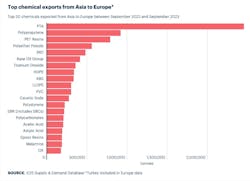Red Sea Transport Crisis Causes Chemical Sector Delays
The chemicals sector in Germany, Europe's largest, is facing supply disruptions due to delayed shipments via the Red Sea. Container shippers are diverting vessels around Africa and away from the Red Sea and Suez Canal following attacks by Yemen's Houthis, impacting crucial Asian imports, including engineering equipment and chemicals, according to a Jan. 22 Reuters news release.
“European manufacturers rely heavily on imports of chemicals from Asia and the Middle East as raw materials to make finished products,” said Will Beacham, chemicals expert and deputy editor at ICIS, in an email interview with Chemical Processing. “Europe’s stagnant economy means that downstream demand is currently very soft. Even so, there are now interruptions to the smooth flow of chemicals into the region as cargoes are rerouted via the Cape of Good Hope. This is making buyers nervous, and many are building inventory for security of supply.”
The Reuters story notes delays are leading to production cuts and challenges in fulfilling orders, impacting companies like Gechem GmbH & Co KG, which has lowered production of dishwasher and toilet tablets. Larger companies like Evonik are also experiencing challenges with short-notice routing changes and delays.
“As ships are re-routed around the Cape of Good Hope, there are delays to deliveries from the Middle East and Asia to Europe (see map), and shipping rates have increased,” explained Beacham. “This route adds 15 days to the typical journey and displaces containers with ships missing their scheduled arrival slots in ports. We have not seen an increase in shipments to Europe from the U.S. Europe is still well supplied because demand is so poor.”
Concern About Higher Chemical Prices
Beacham points out that some spot chemical prices have been rising for a couple of weeks as buyers are forced to pay premiums to secure supply. “Even though demand is poor for most products across Europe, buyer sentiment has changed with some customers feeling nervous about security of supply,” said Beacham.
ICIS has reported rising spot prices for polyethylene, polypropylene, LDPE, melamine, methyl methacrylate, maleic anhydride, epoxy resins, epichlorohydrin and glycol ethers.
About the Author
Traci Purdum
Editor-in-Chief
Traci Purdum, an award-winning business journalist with extensive experience covering manufacturing and management issues, is a graduate of the Kent State University School of Journalism and Mass Communication, Kent, Ohio, and an alumnus of the Wharton Seminar for Business Journalists, Wharton School of Business, University of Pennsylvania, Philadelphia.


